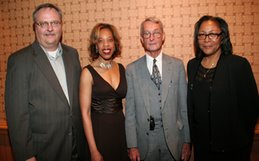
Living Black History: Astronomer Beth Brown Boldly Goes Where Few Have Gone Before
By: Michael H. Cottman, BlackAmericaWeb.com
Dr. Beth Brown, an astrophysicist at NASA, turned a teenage interest in Star Trek and Star Wars into a scientific career studying outer space.
Her area of expertise is not the usual employment choice for most black women – the evolution of celestial bodies, planets, the solar system and far-away galaxies that shine brightly in the X-ray region of the electromagnetic spectrum and can reach temperatures of 10 million degrees.
In short, Brown is an astronomer.
"When I was younger I read a lot of science fiction books and growing up I watched Star Trek," Brown told BlackAmericaWeb.com. "I wanted to be an astronaut, but in college I chose astronomy as a field of scientific study. My parents raised me with love to be an ambitious woman."
Ambitious may be an understatement.
Brown, 38, received her Bachelor of Science degree in Astrophysics from Howard University, and received a Master of Science degree and doctoral degree in Astronomy from the University of Michigan. She is the first African-American woman to earn a doctorate from the University of Michigan's Department of Astronomy.
Brown has also been listed as one of the Women of NASA, an interactive project designed to encourage young women to pursue careers in math, science and technology by providing as role models outstanding women in NASA.
A native of Roanoke, Va., Brown has worked at the NASA Goddard Space Flight Center in Maryland as a scientist in the Astrophysics Science Division. And she makes a clear distinction that she studies astronomy, not astrology.
"I’m not Miss Cleo," she said, noting people often confuse the two areas of concentration.
"I love to learn about, not only the solar system, but our galaxy and universe," Brown said. "Indeed, much of my research has focused on galaxies beyond our own."
Brown started her NASA career at the NASA Goddard Space Flight Center as a research associate for the National Research Council. Prior to that, she joined the National Space Science Data Center, and later relocated to the X-ray Astrophysics Laboratory providing science support and data acquisition. Brown has conducted research on galaxies using data from several observatories, including NASA's Chandra X-ray Observatory.
Most recently, Brown was honored as one of 11 awardees for the NASA Administrator's Fellowship Program, a program designed to ensure the strength of the nation's scientific and technical workforce. She is a member of the American Astronomical Society and the National Society of Black Physicists, for which she previously served on the Executive Board.
"What I enjoy about the teaching, is finding interesting and exciting material to combine with the information presented in the textbook, and then turning that into a lecture that makes sense to someone just starting to learn about astronomy and physics," Brown said.
"In working for NASA, I have enjoyed working with the Public Affairs Office from time to time, doing live TV interviews on topics of interest, such as solar eclipses," she said. "I may not have had those opportunities in another job."
Brown said she also enjoys talking to young people about her job and can best serve as a role model for black youth who aspire to be part of the space program "by continuing to follow my pursuits with dedication and enthusiasm."
Some of Brown’s speeches over the years have included, "Discoveries from NASA Space Science," "Characteristics of Stars and the Effect of Light Pollution," "African-Americans in the NASA Space Science Enterprise," and "Exploring Research Opportunities in Space Science."
"I still like science, because I am still curious about how something works and why something exists," Brown said in an interview for NASA.
"Space continues to fascinate me," she said. "I love my job because I get to work on several different things, and there's always something new being discovered. Sometimes (as with any job) things can get frustrating. But I surround myself with supportive friends and family who help me to get through the tough times. And I also maintain a life outside of work, which keeps me balanced."
Last year, Brown returned to Howard University where she is one of 11 recipients of the NASA Administrator’s Fellowship Program.
NASA started the fellowship program nine years ago to ensure the strength of the Nation’s scientific and technical workforce. The program is designed to enhance the professional development of NASA employees and faculty of minority-serving institutions. The program strives to increase the capability of minority institutions to respond to NASA’s research, development, and educational needs.
There have been 71 fellows selected since the program’s inception in 1997. Previous participants have been instrumental in securing individual and institutional research awards, mentoring students to pursue NASA-related research, and encouraging graduates to pursue a career at a NASA Center.
The program is managed and administered by the United Negro College Fund Special Programs Corporation in Fairfax, Va., for NASA’s Office of Education.
"I have gained some attention for being the first African-American woman to obtain a doctorate from the University of Michigan Department of Astronomy, however I do not focus on that," Brown told BlackAmericaWeb.com. "Instead, I focus on those activities that satisfy me as a professional astronomer."

No comments:
Post a Comment